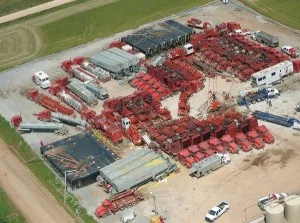In late April of 2014, a train carrying Bakken crude derailed and burst into flames in Lynchburg, VA. No one was injured, but the incident has once again raised safety concerns about the transportation of crude by rail.
Currently, the U.S. Department of Transportation (DOT) Pipeline and Hazardous Materials Safety Administration (PHMSA) is conducting tests of Bakken crude. In February of 2014, PHMSA announced it would pursue fines against Hess, Marthon Oil, and Whiting for failing to properly classify their oil. PHMSA requires the use of nine hazardous materials classifications.
Read more: Hess, Marathon, and Whiting Face Fines for Bakken Oil Classifications
In a May 2014 Wall Street Journal Report, the publication cited the DOT's claim that most energy companies operating in the Bakken haven't provided the requested testing data on crude they ship by rail. Exxon Mobil Corp., Continental Resource and Savage Services Corp. have voluntarily provided the data. A statement released by the U.S. DOT suggested it may take steps to force companies to submit data.
Is Bakken Crude More Flammable?
Bakken oil is produced at a high quality that makes it easier to refine into commercial products and makes it easier to ignite. Light oil production growth in the Bakken isn’t something the industry has never handled before, but the Bakken boom is bigger than anyone expected. As a result of lack of pipelines and additional infrastructure, nearly 70% of all Bakken crude is transported by rail.
Read more: Is Bakken Oil More Flammable?
History of Bakken Crude Oil Train Derailments and Explosions
The incident in Lynchburg, VA is the most recent in a chain of train derailments and explosions connected to Bakken crude. In July 2013, a train derailed and exploded in LacMegantic, Quebec, killing 47 people. The most recent incident, prior to the Lynchburg, VA, incident, occurred when two BNSF operated trains carrying Bakken crude collided and derailed near Casselton, ND, in late December 2013.
Read more: Derailed Train in Canada Was Carrying Bakken Oil
In early April of 2014, a Senate Appropriations Subcommittee hearing was held to examine the level of federal resources that should be allotted for railway safety. Multiple U.S. Senators appealed to the committee for more railway safety funding, including Senators John Hoeven (R) and Heidi Heitkamp (D) of North Dakota.
Read more: U.S. Senators Appeal to Senate Appropriations Committee for Railway Safety Funding
Read more at wsj.com





